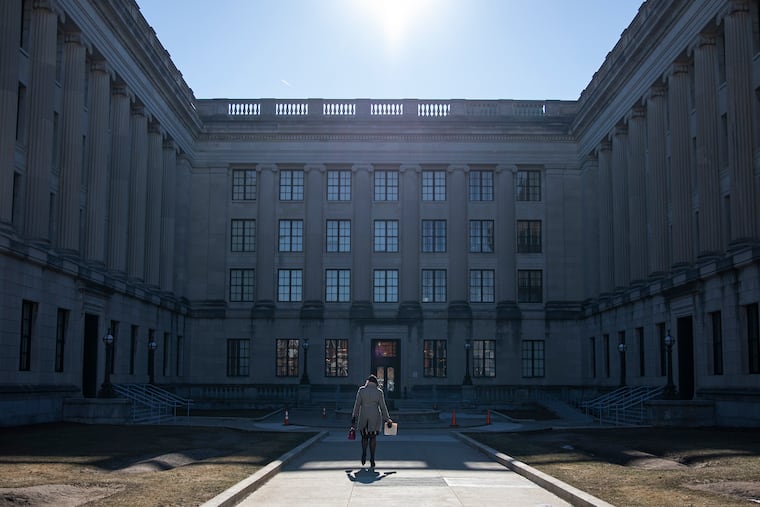In New Jersey, investigators say they are uncovering abuse in the state’s booming rehab industry
Addiction recovery is a “massive business" with little regulation, state investigatory commission members say.

New Jersey is investigating rehab facilities they say have engaged in “patient brokering” — funneling patients to specific treatment centers in exchange for cash or other favors.
Patient brokering is among the most significant findings of a wide-ranging investigation into abuse in the state’s addiction rehab industry. Preliminary findings by the State Commission of Investigation were released in October; a full report is expected in the coming months.
Here’s a primer on common abuses in the rehab industry and what the commission found.
Why did New Jersey investigate abuse in the rehab industry?
Addiction recovery is a “massive business worth an estimated $42 billion,” investigation commission chair Tiffany Williams Brewer said at the beginning of an Oct. 11 hearing in Trenton. But addiction treatment has long occupied a nebulous position in the healthcare world, with little state or federal regulation, she said.
At the same time, drug overdose deaths are at an all-time high in the United States, and many people, especially people of color, are not accessing quality treatment.
What is “patient brokering,” and why would a treatment center do it?
Patient brokering occurs when someone accepts a payment to refer a patient to a specific addiction treatment center. Investigators said at last month’s hearing that patients with private insurance are particularly vulnerable because their insurance programs reimburse rehabs at a higher rate than Medicaid or Medicare — so a rehab that can pull in more privately insured patients stands to make more money than one that accepts public insurance.
The practice is illegal in Pennsylvania and New Jersey, as well as federally. But some rehab facilities in New Jersey have attempted to skirt the law, investigators said, by concealing patient brokering schemes as other kinds of payments.
What examples of patient brokering did investigators find in New Jersey?
SCI Special Agent Eric Rennert told the commission that rehab clinics around the country were paying Recovery Advocates of America, a Hamilton, N.J., nonprofit that helped patients find addiction treatment, to send patients with private insurance their way. The payments were allegedly disguised as donations to the nonprofit or “sponsorship agreements,” Rennert said.
Providing referrals in exchange for donations “incentivizes people, organizations who are supposed to be helping vulnerable patients into treatment centers that may not be best suited for them,” Rennert said. It also encourages nonprofits like Recovery Advocates to mistreat or ignore patients without private insurance.
One patient who wasn’t privately insured said he was encouraged by Recovery Advocates staffers to drink enough alcohol to test positive on a drug test, then was dropped off at a local hospital, where he was told his public insurance would cover three days of detox, at the most.
In a statement, Recovery Advocates chairman John DiMartino said the nonprofit had fully cooperated with the investigator and added he believes the organization “operated within the boundaries of applicable law and with the highest degree of integrity.”
“We take the issues raised by SCI in this investigation very seriously,” he said, and added that the actions highlighted in the hearing “occurred under prior leadership.” The organization’s new executive director, Stacey Ross, a longtime Recovery Advocates staffer, was appointed in August 2022, and under her direction the nonprofit has been “re-examining relationships with donors” to ensure they are legal and ethical, DiMartino said.
What other alleged abuses did the commission uncover?
The commission also focused on Kingsway Recovery, an outpatient treatment center in Mullica Hill, N.J., that investigators said was overbilling insurance companies and funneling money to a sober home operation owned by Michelle DeSimone — the wife of Nicholas DeSimone, who ran Kingsway.
Sober homes, where people undergoing addiction treatment often stay, cannot bill insurance companies. So, investigators said, the DeSimones funded their own sober homes in order to persuade residents there to choose Kingsway for treatment. “It helps to keep clients there,” said SCI special agent Laura Mercandetti.
The alleged scheme is similar to one uncovered in suburban Pennsylvania in 2019, which resulted in prison time for several officials at Liberation Way, an outpatient treatment facility in Bucks County.
A former Kingsway employee also told investigators that higher-ups at the treatment center were encouraging staffers to falsify positive drug tests for clients in order to keep their insurance companies paying for treatment.
The DeSimones allegedly spent money they’d garnered from overbilling on luxury cars, credit card bills and more sober homes, investigators said — much more than they would have been able to afford otherwise. Nicholas DeSimone was subpoenaed to testify at last month’s hearing, but did not attend, and has filed a motion in court to quash the subpoena.
DeSimone’s attorney, Gilbert L. Brooks, said in a statement that DeSimone denies the allegations and is “proud of our record in helping hundreds of individuals to escape the grip of addiction.” Brooks added that DeSimone has been cooperating with the investigation and did not appear at the hearing on the advice of his attorney, because of his motion to quash.
Owners of another now-shuttered outpatient treatment center in Cherry Hill, The Sanctuary, also overbilled clients and spent the money on personal expenses, such as food, clothing, cash withdrawals and car payments, Mercandetti said, leaving insufficient funds to pay employees. “It left numerous employees and patients with no job or treatment center,” she said.
The owners could not be reached for comment.
“Through the insurance proceeds, outpatient treatment centers can be very profitable. Profits were the main motivation and were put above care of clients — people needing care the most,” Mercandetti said.